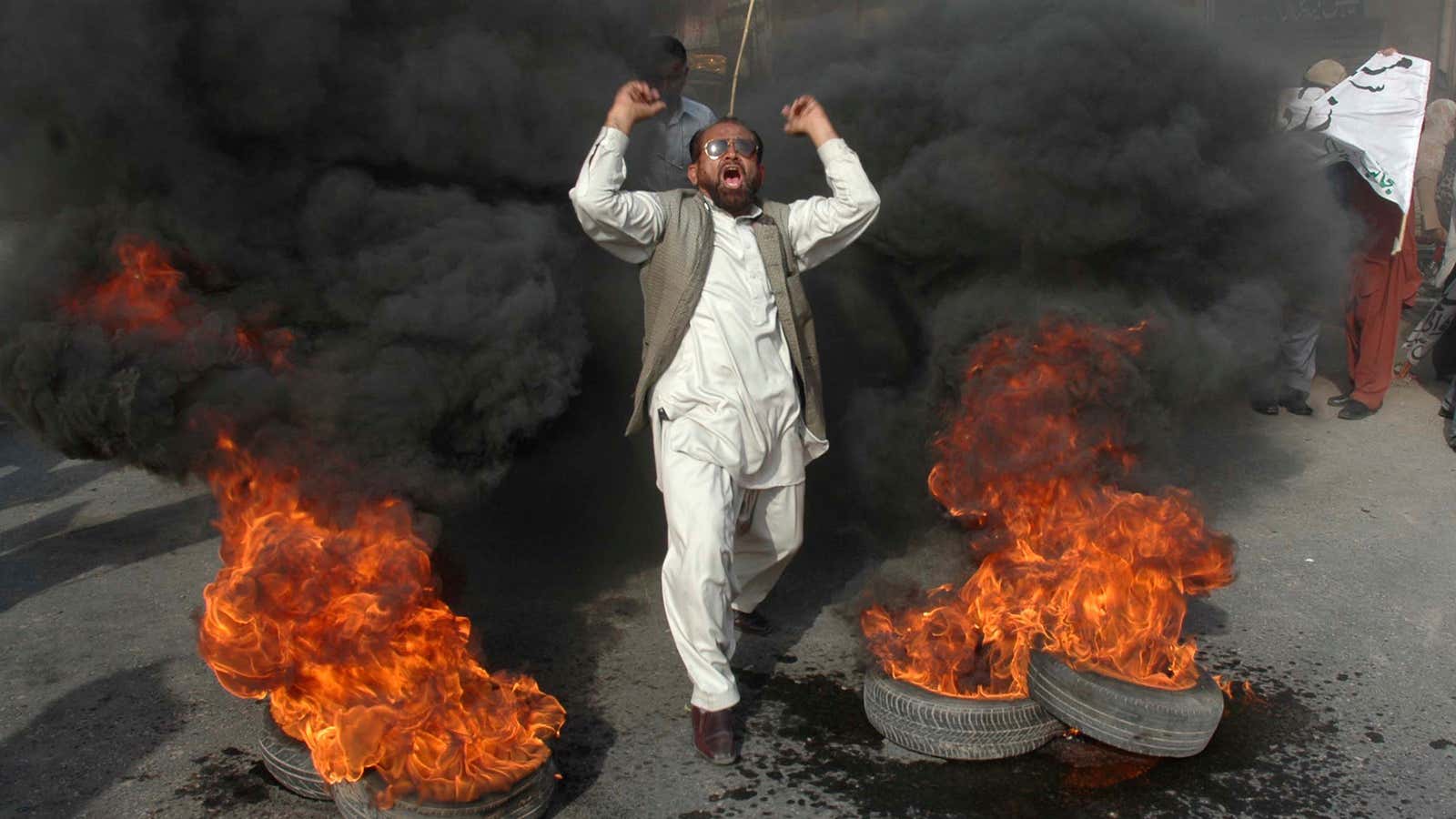In the aftermath of the International Consortium of Investigative Journalists’ (ICIJ) release of the so-called Panama Papers—a massive leaked database of documents from offshore law firm Mossack Fonseca—it’s become public knowledge how many powerful people, including world leaders, have kept, circulated, and hidden away huge sums of money using tax havens. The leak proves that the legacy of corrupt world leaders reaches far beyond the stereotypical cronyism of figures like Vladimir Putin.
Consider Pakistan. If Pakistan really was a poor country, so many of her leaders wouldn’t be on this list. But Pakistan isn’t actually a poor country—it’s kept poor by gross structural imbalances, and the predatory actions of a shockingly corrupt political class. Not only is Pakistan’s elected prime minister, Nawaz Sharif, now under scrutiny, but numerous other prominent Pakistanis are named by the Panama Papers, too. While we can expect more leaks, we shouldn’t lose sight of the connection between this corruption and extremism.
People on the edge
We spend a lot of time talking about the language by which violent extremism is framed, but not nearly enough time talking about the violence itself. By and large, all humans have an expectation of fair treatment. Likewise, we become upset when things do not work out that way. Some people turn their anger inward. Others turn their anger outwards, reacting violently against societies they perceive as rigged.
That doesn’t make the mode of their protest moral. But it should make it more comprehensible.
Here in the United States, politicians seem content to push Americans into poverty, cutting important programs and denying funding for valuable causes—all the while employing every available shortcut to shave a few more points off their own tax returns. It’s no wonder we have so much populist fury. It’s no wonder people turn to Donald Trump or Bernie Sanders. They sense that many of our leaders have not been honest with us. But what happens in societies where far more people live on the edge?
The sad fact about the modern Muslim world is that its own leaders have held it back. Pakistan is one such example. How can a country that has developed nuclear weapons fail to offer energy and food security to its people? Sure, you could argue about colonial history, about Pakistan’s dangerous neighborhood, but I am not claiming that Pakistan can be or will be New Zealand. But North and South Korea are literally right next door to each other, broadly sharing the same culture, history and language, and yet they’re worlds apart.
What makes the difference?
The Panama Papers are, as Quartz’s own Bobby Ghosh points out, are just the tip of the iceberg. They’re one set of leaked documents; a huge set, no doubt. There are likely many more. After all, Mossack Fonseca is merely the fourth-largest tax haven law firm. We can speculate, can’t we?
Imagine, for a moment, how much money Middle Eastern royals, dictators, and various crony capitalists have stashed away, laundered, or simply shunted around. Consider the present condition of the Middle East, and how many billions, if not trillions, of dollars were flushed down the toilet in pursuit of pleasure, acts of hedonism, vanity projects, cults of personality and grudge matches. All money that could have been investing in the future of a region that was once one of the most dynamic in the world.
When Baghdad was the most powerful city in the world, it was still surrounded by desert. Her leaders were Arab and Muslim. They didn’t have oil. But they were able to build societies remarkably dynamic and progressive for their time. The same pertained in many Muslim societies, no matter how geographically removed they were.
Today, the contrast is stunning. I have driven past Saudi palaces that stretch forever. And yet, only a few miles later, I am in a decrepit neighborhood wholly unconnected to one of the world’s (theoretically) wealthiest societies. I’ve walked down Cairo streets past people who have no bathrooms to use, and watched government limousines zip by, the windows tinted, the air conditioning blasting. I see those realities. But I don’t live them. And if I did, I sometimes wonder how I would channel my anger.
How would I react to a life full of overt injustices?
Probably, I would turn to religion, seeing as my society is already deeply informed by religion.
No god but Allah
Islam is a religion that emphasizes monotheism absolutely. Its followers are instructed in a theology that insists on the immediate and unmediated connection between humanity and its Creator, and rejects those who hold themselves up as any kind of arbiters. That���s the core of Islamic theology. Today, many Muslim nations are deeply corrupt, lacking transparency and accountability. They suffer gross extremes of inequality and appear globally impotent. Many are also dominated by political cultures that stand in direct contradiction to the basic principles of Islamic theology.
Keeping in mind how sensitive the idea of a Mohammed cartoon was, if there’s not supposed to be images of sacred figures, what are we to make of the nearly ubiquitous imagery of political strongmen?
In many Muslim countries, it is sad to say, the image of the leader, rarely elected, infrequently if ever accountable, and above all unchallengeable, is as common as a religious motif; the leader, and often his family, is often held inviolable in the way Islamic theology teaches that only God is supposed to be. Is it any wonder that the response to decades of corruption, malfeasance, bribery and personal and familial enrichment, at the expense of the masses, becomes so quickly extreme? How else do you change a system rigged entirely against you except to claim a still higher power?
It’s a tragedy, and yet there will be no change until and unless we understand that the roots of our extremism lie in indignity. And, probably, in dozens of offshore bank accounts.
